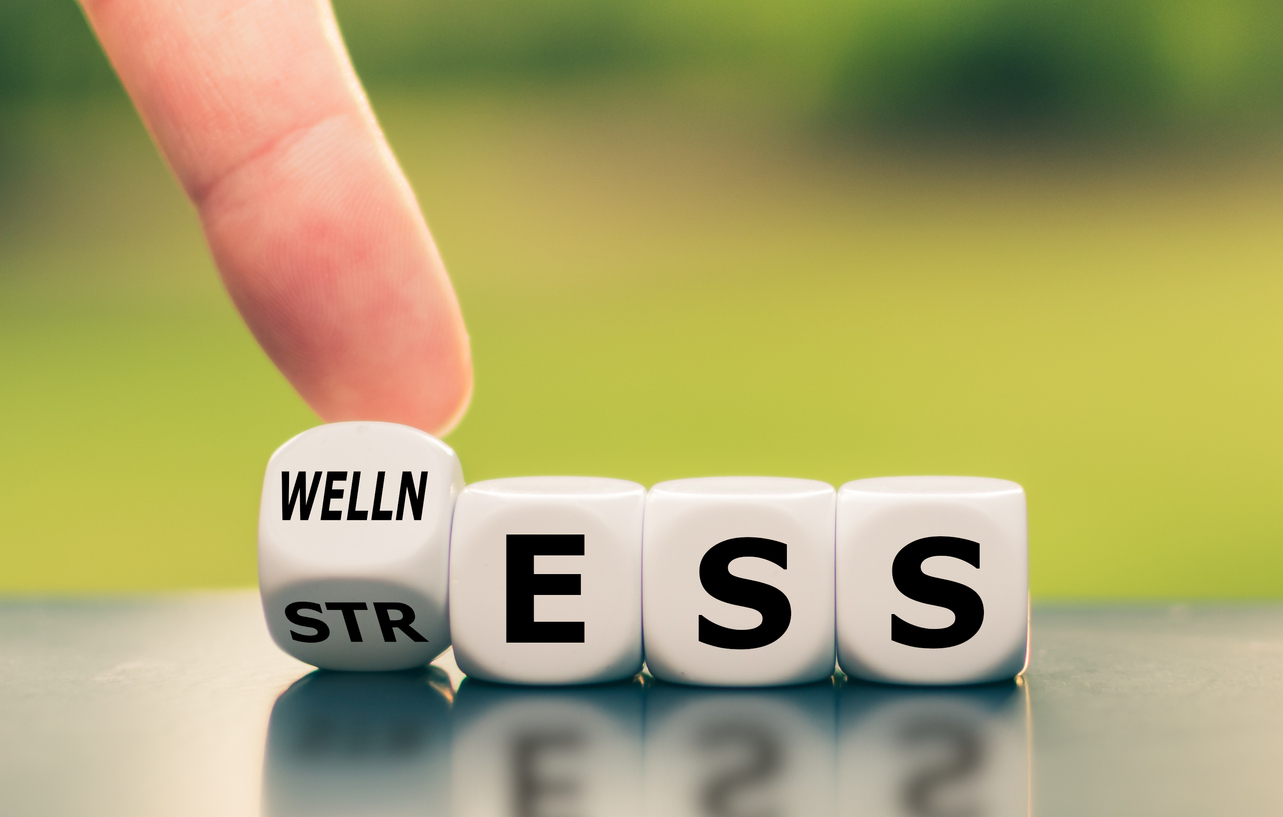It’s been a stressful year. We don’t need to tell you how damaging chronic stress can be for the body and mind. Here are some proven techniques to help you de-stress in 2 minutes or less.
-
Do a body scan
Start by focusing on your feet. Scan them with your mind and mentally release any physical tension you find. Next, move up to your shins, then knees, and so on until you reach the top of your head.
This technique boosts your awareness of your mind-body connection. It helps you identify stress that you may be holding in your body without realizing it, while also bringing you back to the present moment. Extend or shorten this practice based on what works for you.
2. Take a meditative moment
Meditation doesn’t need to last for 20 minutes each morning or an hour each night in order to be effective. In fact, research shows that taking even just a moment to focus on your breath can give you benefits like reduced stress and sharpened focus.
You don’t need to move to the floor or have a special pillow to take advantage of the stress-relieving benefits of meditation. Wherever you are, simply bring your attention to your breath. Breathe in and out, extending your exhale. If thoughts arise, don’t resist them. Close your eyes if it feels natural. Do this for as long or as short as you need.
3. Try a breathing exercise
The 4-7-8 breathing exercise is a common relaxation technique. Inhale for 4 seconds, hold that breath for 7 seconds, and then exhale for 8 seconds. Repeat this at least 3 times, or as many times as you wish.
Why does this technique calm you down? Researchers at the Stanford University School of Medicine found that certain nerve cells in the brain link your breathing to your state of mind. These studies showed that altering your breathing patterns can induce changes in your levels of relaxation, attention, excitement, and anxiety.
Breathing techniques have a long history of effectiveness in relaxation, therapeutic, and mindfulness practices. Use them when you need to promote a calmer state of being.
4. Connect with someone
Even during COVID-19 when it’s more difficult than ever to be around the people you love, social connection helps you maintain peace of mind. You can foster connection even while remaining physically distant from others. Call a friend just to say hello. Or send a text to someone you haven’t talked to in a while wishing him or her well.
Several research studies support the mental (and physical) health benefits of social connection. If you’re feeling extra anxious or stressed, reach out to someone, even if you just have 2 free minutes. Feeling supported and giving support can calm the mind in extraordinary ways.
5. Try progressive muscle relaxation
Progressive muscle relaxation (or PMR) is a technique in which you consciously tense your muscles and then systematically release the tension.
Begin by clenching your feet, hold for a few seconds, take a deep breath, then exhale and release the tension. Repeat this for other parts of your body, similarly to how you would with the body scan technique. Studies show that PMR can be a useful tool in regularly reducing feelings of stress and anxiety.
6. Focus on your immediate surroundings
Oftentimes, we get wrapped up in our thoughts and mentally leave our present surroundings. If you feel stressed, get out of your head by getting into your physical space. To do this, mentally or verbally identify 5 things you see around you. For example, “window,” “someone walking,” “tree,” etc.
This technique can be extra effective if you pair it with a physical sensation. Some people wear a hair tie or rubber band around their wrist, and each time they identify something they see they gently snap the band against their skin. The combination of focusing your body’s senses of sight and touch on the present moment helps get your mind there, too.
This practice helps remind you that the stress you feel may not actually be physically present. Instead, it probably just exists in your thoughts, from which you can take a conscious break.
7. Find something funny
Life is funny, but we often get caught up in the parts that are scary or anxiety-inducing. Humor helps. When you feel stressed, read or watch something that makes you laugh. Turn on a short YouTube video, send a friend a silly meme, or enjoy some other form of funny content.
Studies show that laughing releases the “feel-good” brain chemicals called endorphins, as well as relieves stress, lowers blood pressure, stimulates circulation, and provides several other mental and physical health benefits. If you’re feeling chronically stressed lately, make it a habit each day to get a quick dose of positive emotion through humor.
8. Play a mental game
Logic games, word puzzles, and other mental games demand your concentration when you play them. When your own problems feel overwhelming, these games give you a challenge that comes with a solvable solution. Whether you choose a puzzle, verbal challenge, or something else, these games put you back in the present moment and help you focus, tasks that can be difficult to do when you feel stressed.
The game you choose could be a sudoku, word search, board game, or even an activity like counting backwards or reciting sentences where each word has to start with the same letter. These are ways to stimulate your mind while jail-breaking it from stressful thoughts.
***
If you’re feeling more stressed than usual, let your primary care physician know. Your doctor can help you protect your health from stress-related ailments. SteadyMD pairs you with a doctor based on your diet, lifestyle and medical concerns, not just someone who happens to be local. Take our 90-second quiz to get matched with a doctor who aligns with your life.
